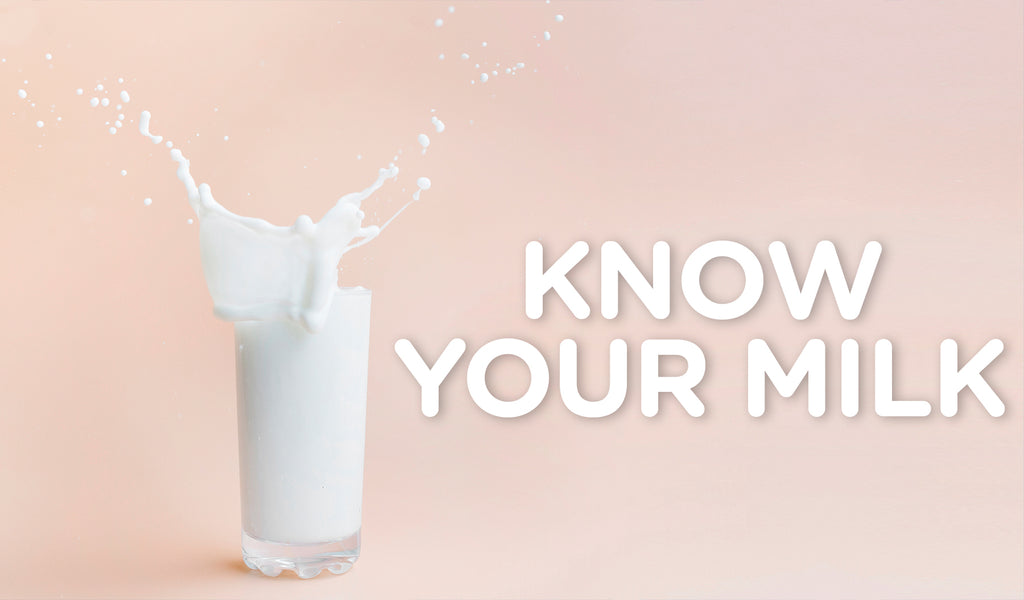Know Your Milk
Posted by ADMIN

As per dictionary terms, milk can be defined as a nutrient-rich liquid produced by the mammary glands of mammals. The primary source of nutrition for young mammals (including breastfed human infants) before they can digest solid food. As we progressed the popularity of plant-based alternatives to cow's milk - and the perception that these options are healthier - makes it difficult to know if you're making the right choice.
Listed below are different types of milk, with their advantages and disadvantages, to help you decide which one is best for you& your family.
The most natural & known form of milk is high in protein and calcium and is consumed. While the world is increasingly moving toward alternatives to animal products, not everyone chooses to consume cow milk.
Made with soybean, soya, or soy milk with the same amount of protein as cow's milk is becoming a substitute for dairy milk, especially by vegan or lactose intolerant individuals. Some people are allergic to soybeans, so they should avoid soy milk. The presence of natural antinutrients can reduce the ability of the body to absorb essential nutrients and impair the digestion of protein and carbohydrates.

The protein content is low compared to cow's milk or soy milk, and it must be fortified with vitamins, making it unsuitable for those with nut allergies. The protein content in almond milk is lower in comparison with cow's milk or soya milk. It shouldn’t be consumed by those with a nut allergy.

One of the tastiest cow milk alternatives with a subtle coconut flavour, coconut milk is full of nutritional values and low in calories. The texture is rich and creamy with a thick consistency. Calories and saturated fats in it are higher than those found in other plant-based milk, which leads to weight gain.

Oat milk is a great pick, especially for vegans. It's high in protein and contains many other nutrients. A cup of oatmeal milk contains a lot of fiber and plant-based protein and promotes digestion. The packed oat milk is artificially sweetened and is loaded with lots of carbohydrates and calories. Oat milk is not a complete alternative for kids’ daily requirements as it lacks the nutritional values required for their complete growth & development.

Choosing the type of milk is an absolute personal call depending upon the pro & cons of the type of milk. Whatever the type of milk you choose, we're sure you'll love sipping milk with the magical milk-flavoring straw Strawfit. Happy Sipping!
Listed below are different types of milk, with their advantages and disadvantages, to help you decide which one is best for you& your family.
Cow’s Milk
The most natural & known form of milk is high in protein and calcium and is consumed. While the world is increasingly moving toward alternatives to animal products, not everyone chooses to consume cow milk.
Soya / Soy Milk
Made with soybean, soya, or soy milk with the same amount of protein as cow's milk is becoming a substitute for dairy milk, especially by vegan or lactose intolerant individuals. Some people are allergic to soybeans, so they should avoid soy milk. The presence of natural antinutrients can reduce the ability of the body to absorb essential nutrients and impair the digestion of protein and carbohydrates.

Almond Milk
The protein content is low compared to cow's milk or soy milk, and it must be fortified with vitamins, making it unsuitable for those with nut allergies. The protein content in almond milk is lower in comparison with cow's milk or soya milk. It shouldn’t be consumed by those with a nut allergy.

Coconut Milk
One of the tastiest cow milk alternatives with a subtle coconut flavour, coconut milk is full of nutritional values and low in calories. The texture is rich and creamy with a thick consistency. Calories and saturated fats in it are higher than those found in other plant-based milk, which leads to weight gain.

Oat Milk
Oat milk is a great pick, especially for vegans. It's high in protein and contains many other nutrients. A cup of oatmeal milk contains a lot of fiber and plant-based protein and promotes digestion. The packed oat milk is artificially sweetened and is loaded with lots of carbohydrates and calories. Oat milk is not a complete alternative for kids’ daily requirements as it lacks the nutritional values required for their complete growth & development.

Choosing the type of milk is an absolute personal call depending upon the pro & cons of the type of milk. Whatever the type of milk you choose, we're sure you'll love sipping milk with the magical milk-flavoring straw Strawfit. Happy Sipping!
